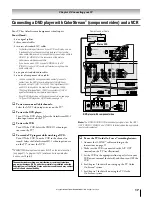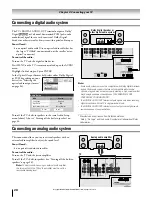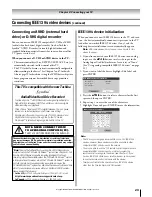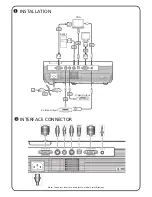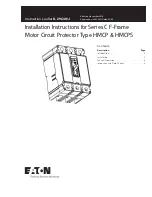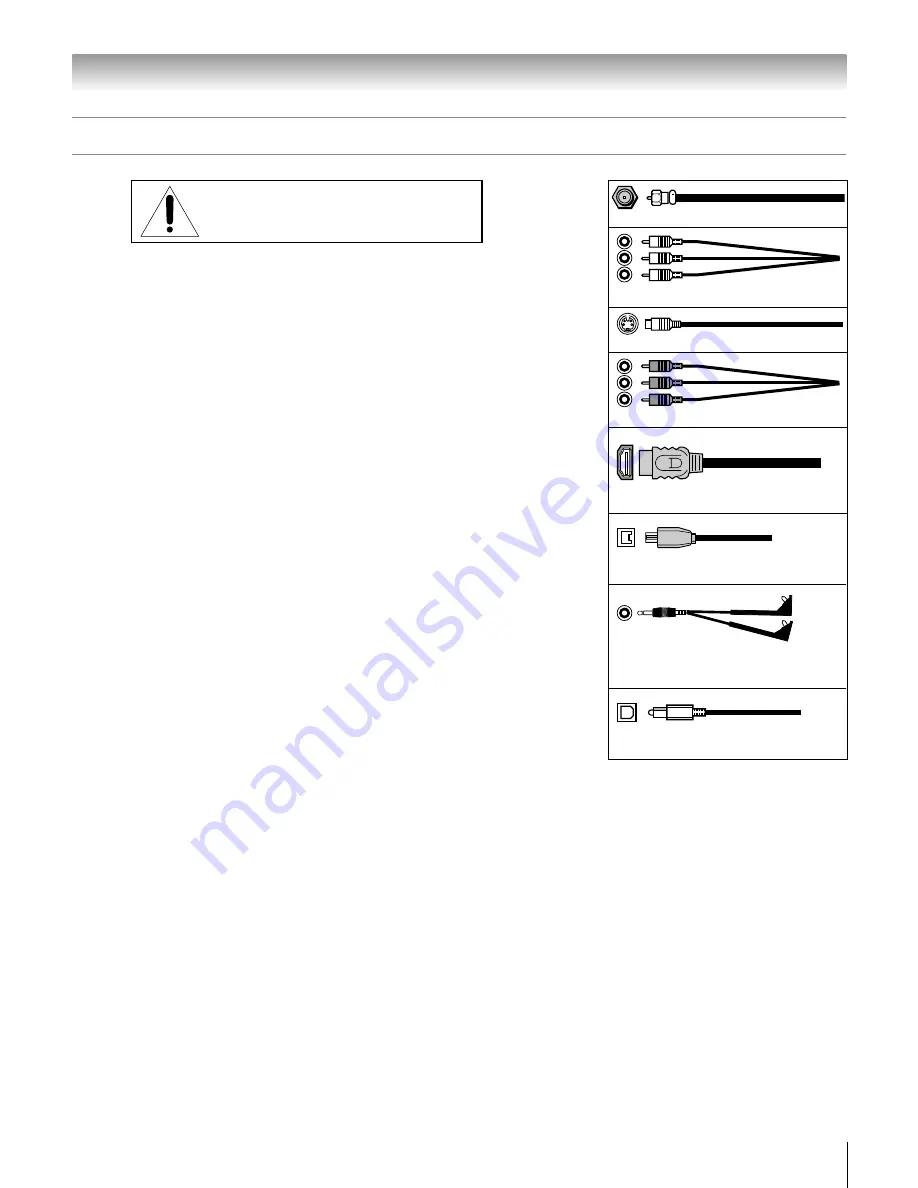
11
Copyright © 2005 TOSHIBA CORPORATION. All rights reserved.
(E) 56/62/72HM195
Overview of cable types
Component video cables (red/green/blue)
Coaxial (F-type) cable
Standard A/V cables (red/white/yellow)
S-video cable
HDMI cable
Dual-wand IR blaster/ G-LINK™ cable
(2 included)
Note:
Two dual-wand IR blaster/G-LINK™ cables are included with your TV. All other required
cables, if not provided with your other devices, can be purchased at many electronics accessory
suppliers.
●
Coaxial (F-type) cable is used for connecting your antenna, cable TV service, and/or
cable converter box to the ANT-1 and/or ANT-2 RF inputs on your TV.
●
Standard A/V cables (composite video) usually come in sets of three, and are for use
with video devices with standard audio and standard (composite) video output. These
cables (and the related inputs on your TV) are typically color-coded according to use:
yellow for video, red for stereo right audio, and white for stereo left (or mono) audio.
●
S-video cable is for use with video devices with S-video output. Separate audio cables
are required for a complete connection.
Note:
An S-video cable provides better picture performance than a composite video cable. If
you connect an S-video cable, be sure to disconnect the standard (composite) video cable or
the picture performance will be unacceptable.
●
Component video cables come in sets of three and are for use with video devices with
component video output. (ColorStream
®
is Toshiba’s brand of component video.)
These cables are typically color-coded red, green, and blue. Separate audio cables are
required for a complete connection.
Note:
Component video cables provide better picture performance than a standard (composite)
video or S-video cable.
●
HDMI cable is for use with devices with HDMI (High-Definition Multimedia
Interface) output. HDMI cable delivers digital audio and video in its native format.
This cable carries both video and audio information; therefore, separate audio cables are
not required for a complete HDMI device connection. See page 19 for further details.
Note:
HDMI cable provides better picture performance than a standard (composite) video or
S-video cable.
●
IEEE1394 cable is for use with video devices with compressed digital video output
that meet CEA specifications for IEEE1394. This cable carries both video and audio
information; therefore, no separate audio cables are required for a complete connection.
See pages 22–24.
Note:
• The transmission capability of any IEEE1394 cable used with this TV must be S400
(400 Mbps maximum).
• IEEE1394 cable provides better picture performance than a standard (composite)
video or S-video cable.
●
Dual-wand IR blaster/G-LINK
™
cable is for use with video devices with IR (infrared)
remote control. Two of these cables are included with your TV. One is for connection
to the G-LINK
™
terminal (page 25) to enable TV Guide On Screen
™
recording
features (Chapters 5 and 7). The other can be used with the TV’s IR pass-through
feature (page 21) and TheaterNet
™
on-screen device control feature (page 45).
Note:
The two IR blaster/G-LINK™ cables included with your TV have specific characteristics that
allow them to work properly with this TV’s IR OUT and G-LINK™ ports.
Never use other
aftermarket IR blaster or G-LINK™ cables with this TV
. Other cables may not function
properly and can cause damage. THIS TYPE OF DAMAGE IS NOT COVERED BY YOUR
TOSHIBA WARRANTY.
●
Optical audio cable is for connecting receivers with Dolby Digital or PCM
(pulse-code modulation) optical audio input to the TV’s DIGITAL AUDIO OUT
terminal. See page 20.
IEEE1394 cable (4-pin)
Optical audio cable
Chapter 2: Connecting your TV
Note:
Although your TV includes both HDMI
and IEEE1394 connections, it may not
operate with another device you have that
includes such a connection. For example, the
IEEE1394 ports are not intended to operate
with current model Mini DV camcorders, and
the HDMI input is not intended for
connection to a computer. Copyright
protection requirements may also prohibit or
limit connectivity. See page 19 for details
about the HDMI input. See pages 22–24 for
details about the IEEE1394 ports.
NOTE: NEVER CONNECT THIS TV
TO A PERSONAL COMPUTER (PC).
THIS TV IS NOT INTENDED FOR USE WITH A PC.
#01E_009-011_566272HM195
7/28/05, 4:11 PM
11
Black

















